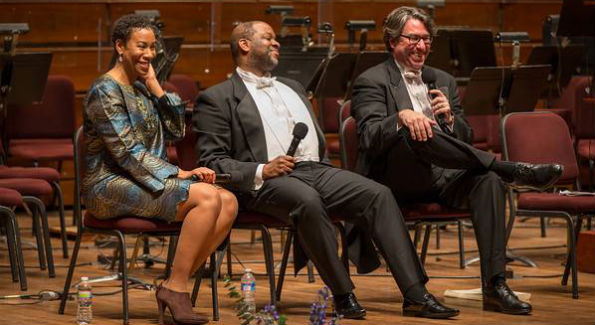The Washington Chorus really brought out the dramatic tones in Mendelssohn’s oratorio.

Following the performance, soprano Janice Chandler Eteme, baritone Stephen Salters and conductor Julian Wachner share a light moment during the ‘Talk Back’ moderated by WL Performing Arts. (Photo by Chris Burch)
In recent years, The Washington Chorus has tackled several major choral masterworks, such as Bach’s “Mass in B Minor” and the Mozart “Requiem,” but the recent performance of Mendelssohn’s grand oratorio “Elijah” marked a first for the symphonic chorus. Monumental in scope, its undue length of three hours, requirements for a large orchestra and a varied cast of soloists makes it almost easier for some ensembles to avoid performing it.
But music director Julian Wachner, a distinguished roster of vocal soloists and the Washington chorus made time stand still in the Kennedy Center Concert Hall, transporting the audience from one glorious vignette to the next.
Wachner has a gift for not just assembling musical forces, but using every element of a performance for dramatic effect. The quartet of soloists included soprano Janice Chandler-Eteme, mezzo-soprano Laura Vlasak Nolen, tenor Benjamin Butterfield and as Elijah, baritone Stephen Salters. Filling out the ensemble solos were soprano Natalie Conte, mezzo-soprano Pamela Terry, tenor Jerry Kravinski, bass Mitchell Galloway-Edgar and notably baritone Steven Combs, who is quite familiar to audiences of the Washington Bach Consort.
The beginning introduction of the work was in the form of an accompanied recitative sung by Salters. As Elijah, his sense of emotional depth in his delivery drew the listener into the reverent, but majestic, nature of the work. Wachner took command of the orchestra in the sweeping allegro of the overture, as the sense of urgency was punctuated by timpanist Jauvon Gilliam and the lower brass, leading into the angst -filled choral cries of “Help Lord!” Full-bodied singing marked the choir’s entrance with the forte of the orchestra. Most notably, Kennedy Center’s Casavant organ, at the hands of organist Joshua Stafford, was on fine display, cutting right through the massive wall of sound contrary to the initial impression of the instrument after hearing at its first public concert.
The dark color of Nolen’s mezzo and Eteme’s clear soprano blended beautifully in the duet “Zion Spreadeth Her Hands for Aid.” Butterfield shined in the gem “If With All Your Hearts;” he sang in such a way that demanded the listener give rapt attention to the command communicated in the aria.
Though “Elijah” is an oratorio, a sacred work generally on a biblical theme, this performance took on the heightened drama of an opera. Special lighting effects were used throughout that created an opera-like setting for the work. For example, during Elijah’s fervently-sung aria “Is Not His Word Like A Fire” the backdrop is cast in burnt orange. These “mini scenes” occured throughout the evening. During the quartet “Cast Thy Burden Upon the Lord” Eteme, Nolen, Butterfield and Combs appeared above the choir in the box tier; the voices seemed to waft heavenly from a distance like angels. Another transcendent moment of the performance were the cherubic voices of the Children’s Chorus of Washington, who took the audience by surprise as their voices floated from above the rear of the hall in “Lift Thine Eyes.” As The Youth, the tender voice of boy soprano Matthew Dulaney, in conjunction with the declamatory delivery by Salters, had to be one of the most endearing moments of the afternoon.
Eteme was certainly a standout throughout, as her elegant presence was matched by the beauty of her singing.
A glowing moment was in the aria “Hear Ye Israel” in which her voice soared, coupled with tasteful dynamics and instinctive nuances. Filling the hall of the Kennedy Center Concert Hall, the voices accompanied by the full orchestra and undergird of the organ gave immense resonance to the phrase “Thou fillest Heaven with thy glory” concluding with an expansive choral ‘amen.
‘
WL Performing Arts was the guest moderator for the popular ‘Talk Back” held after the performance with conductor Julian Wachner, soprano Janice Chandler-Eteme and baritone Stephen Salters.
Recently named among the Forty Under 40 for his contributions to arts and humanities, Patrick D. McCoy received a B.M. in vocal performance from Virginia State University and a M.M. in church music from the Shenandoah Conservatory in Winchester, Va. He has contributed arts and culture pieces to CBS Washington, The Afro-American Newspaper and the newly published book, “In Spite of the Drawbacks” (Association of Black Women Historians), which includes his chapter on legendary soprano Leontyne Price. McCoy has interviewed some of the most acclaimed artists of our time, including Renée Fleming, Denyce Graves, Norman Scribner, Julian Wachner, Christine Brewer and Lawrence Brownlee. Listen to these interviews and others at Blog Talk Radio. McCoy may be reached via email at wlperformingarts@aol.com and on Twitter @PatrickDMcCoy.




